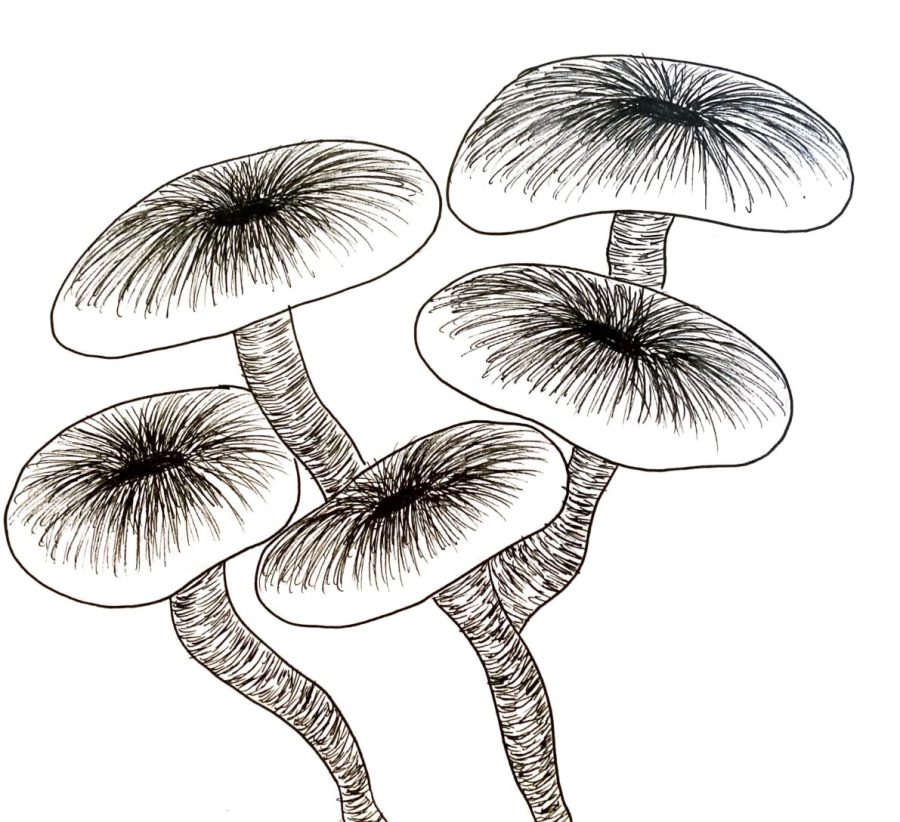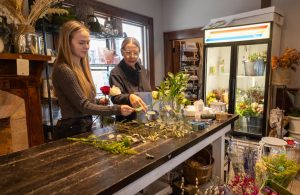Hospitality to mushrooms: Boone’s local fungi seller
November 1, 2022
It’s an early morning at the Watauga County Farmers’ Market. There are stalls selling fresh eggs, red, yellow and dawn-pink peppers. Another stall is selling a plethora of homemade goods and art; wooden jewelry, colorful prints of the Appalachian mountains and hand-crafted leather wallets. One stall, however, sells something a little different.
“Do these things get you high?”
“What kind of shrooms are you selling?”
“What do I do with these anyway?”
“I bet they’re not the kind I did in college.”
These are just some of the comments and questions that Avery Hughes and Miika Greenwood, owners of High Country Fungi, may receive on a regular day. They aren’t annoyed by it. Their business, after all, is selling fungi.
“Half the people who come up just want to talk,” Greenwood said. “If they don’t buy anything, I don’t care; they learn something.”
From April to November, their stall at the Watauga County Farmers’ Market looks like a parade of shapes and colors; the selection is vast. They have a cotton candy-colored fungus that grows like the upward pipes of a church organ, known as the pink oyster. They have lion’s mane fungi, which aptly earns its name from the hair-like tendrils that grow from it. Chestnut fungi are colored like a marshmallow made brown by an open fire sitting out in open air. Even the somewhat exotic spindly, Cheeto yellow cordyceps, nicknamed the zombie fungus, can be found at their stall.
As for business, the first day of the 2022 Farmers Market Season they opened at 8 a.m. and by 10:30 a.m., they were sold out.
“I really didn’t expect them to come out of the gates like that,” Hughes said. “We sold probably 80 pounds today.”
This, however, has not necessarily always been the case.
Hughes’ mushroom journey started when he took a shiitake log mushroom growing course, which then led to a small backyard farm; nothing commercial, but Hughes said it “planted the spore” for his exploration of the subject.
After working in the hospitality industry for several years, Hughes had been looking for something more rewarding. He moved to Boone and started a diet that included reishi mushrooms on the advice of a herbalist, something Hughes said improved his quality of life significantly. Moreover, it made him realize that he believes mushrooms are overlooked.
It wasn’t until 2019, when Hughes took a course with a mushroom education-based organization, Fungi For The People, did he realize that it could become his career.
“He flew out to Oregon to do this 10-day intensive course on how to grow mushrooms on a commercial scale,” Greenwood said, “And then he came back and said ‘This is what we are going to do.’”
Greenwood, Hughes’ partner, said she was somewhat skeptical, at first, but believed in Hughes from the start, and later would learn from him.
“I didn’t really know what to think. I didn’t know if this was indoors or outdoors thing. I was going to become a Pilates instructor, and then COVID happened, and that got canceled. So, after that, what did I think? Teach me.” Greenwood said.
After receiving a $3,000 grant from Western North Carolina AgOptions, Hughes upgraded their brewery-turned-laboratory and worked full time to produce their first 50 pounds of mushrooms in early 2020. After COVID-19 spread to the U.S., Hughes said they spent time going to the public library at night to sell their mushrooms out of the back of their car which did not last long.
While business had been “okay” during the 2020 season, 2021 had allowed Hughes and Greenwood to expand their business.
“Things really just mushroomed then,” Hughes said. “Miika had been thinking about going back to her job, and she decided to do this full time with me. It’s really grown our relationship.”
In the height of the 2021 season, Hughes said they were doing anywhere from 250-300 pounds of mushrooms a week and continued to develop medicinal mushrooms alongside their culinary mushrooms. which led to the creation of their own medicinal tinctures. After the 2021 season, Hughes was elected to the Watauga Farmers Market board of directors for this year.
Some, if placed in their shoes, may be annoyed by the incessant “stoner comments,” but Hughes and Greenwood see it differently. Instead, it’s an opportunity for education.
Whether it be about health, how they grow or about environmental causes, Hughes aims to bring an educational standpoint to the topic, but it always comes back around to his personal relationship with mushrooms. A 2021 study from Pennsylvania State University found that humans that consume 20 grams of mushrooms a day are 45% less likely to develop cancer, something which Hughes has a personal connection with.
“When I was 19, my mom passed away from cancer,” Hughes said. “I wanted to give people health options, even if it’s just in a preventative measure.”
Using mushrooms for your health is not a new thing. In discussion with Hughes, he mentions Paul Stamets, a mycologist whose mother ate turkey tail mushrooms that he claims helped cure her cancer, or Hughes will discuss how to work mushrooms into your diet.
Fry, bake, put them in your tea, grind them up, eat them raw; Hughes has eaten them basically any way possible. At their stall, they can be bought in the form of an alcohol tincture, as a larger mushroom, or even as a grow kit. The proceeds help them develop their business and, moreover, helps them bring their business to local charities, Hughes said.
In the past year, Hughes and Greenwood have worked with Hospitality House to distribute excess to those in need, helped develop mushrooms which act as environmental filters for E. coli and brought their products to the Boone Earth Fare and local health market Be Natural.
For Hughes, bringing fungi to those who need them is what the business is all about.
“Mushrooms themselves are extremely resourceful. Mycelium is reaching out in different ways,” Hughes said. “I think that that’s a good way to think about human society; the different ways we can reach out and work together — protocooperation and symbiosis.”

















